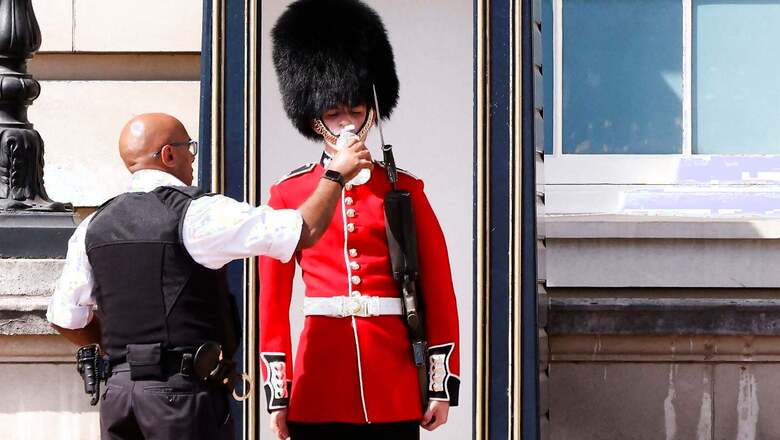
views
As Britain recorded its hottest day on Monday with temperatures soaring to hit 40 degree celsius mark, a member of the Queen’s Royal Guard was seen receiving drinking water while on duty outside Buckingham Palace in London.
A member of the Queen's Guard receives water to drink outside Buckingham Palace in London, with Britain on course for its hottest day on record https://t.co/bb4Th0gZBh ???? @John_Sib pic.twitter.com/9wfBySVbC9— Reuters (@Reuters) July 18, 2022
The UK Health Security Agency (UKHSA) and the Meteorological (Met) Office has issued its first-ever red alert for extreme heat, warning of danger to life from the extreme heat. The Health Security Agency (UKHSA) raised the heat health warning to Level 4 for England for Monday and Tuesday.
The UK government had announced a “national emergency” alert as temperatures were forecast to surpass the 38.7C (102 Fahrenheit) recorded in the Cambridge University Botanic Garden in 2019 on Monday and Tuesday. The heatwave is set to peak on Tuesday before some rain forecast for Wednesday.
Train companies have been forced to cancel services and schools were closed earlier than usual on Monday as health authorities rushed to keep ambulances on standby.
Downing Street said railway speed restrictions may be needed “on some parts of the network… to manage the hot weather and to avoid any potential damage. Very hot temperatures can affect rails, overhead power lines and signalling equipment, as well as “bend and buckle” tracks.
Network Rail, which runs the country’s railway networks, warned that journeys will take significantly longer and delays are likely. The national rail network strongly encouraging customers to only travel if necessary on Monday and Tuesday.
“Due to the exceptionally hot weather that is expected… customers should only use London’s transport network for essential journeys. If customers do need to travel, they should check before they travel as we are expecting there to be some impact to Tube and rail services,” said Transport for London (TFL) chief operating officer Andy Lord.
Jake Kelly from Network Rail told Reuters he hoped normal operations would resume on Wednesday, when temperatures are forecast to fall, but that would depend on “the damage that the weather does to the infrastructure over the next couple of days”.
Heatwave Response
According to Britain’s Meteorological Office, a Level 4 alert is defined as a national emergency and is used when a heat-wave “is so severe and/or prolonged that its effects extend outside the health and social care system. At this level, illness and death may occur among the fit and healthy, and not just in high-risk groups.”
The Met Office said “substantial” changes in working practices and daily routines would be required and there was a high risk of failure of heat-sensitive systems and equipment, potentially leading to localised loss of power, water or mobile phone services.
Kit Malthouse, a minister in charge of government coordination, told BBC the government was prepared for the extreme weather and would seek to learn lessons from it. “We definitely need to adapt the way we build buildings, the way we operate and look at some of our infrastructure in the light of what seems to be an increasing frequency of these kinds of events,” he told BBC Radio.
(With inputs from Reuters)
Read all the Latest News, Breaking News, watch Top Videos and Live TV here.




















Comments
0 comment